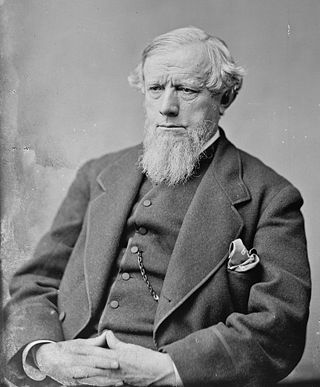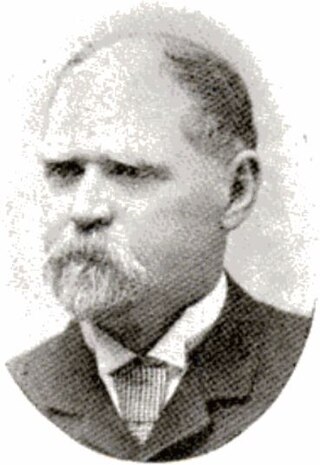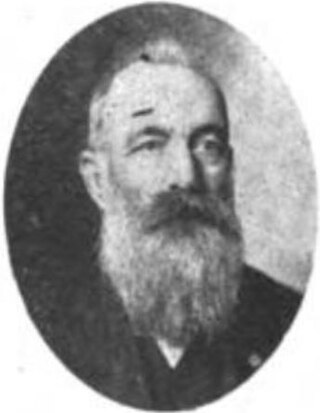
Allen Granberry Thurman,sometimes erroneously spelled Allan Granberry Thurman,was an American politician who served as a United States representative,Ohio Supreme Court justice,and United States senator. A Democrat,he unsuccessfully ran for vice president of the United States in 1888 as the running mate of President Grover Cleveland.

James Lowry Robinson was a Democratic politician from the U.S. state of North Carolina;he served as the fourth lieutenant governor of the state for four years under Governor Thomas J. Jarvis and as acting Governor of North Carolina for one month in 1883. Earlier in his political career he served in the North Carolina House of Representatives,including as Speaker,and then the North Carolina Senate.

William Amos Poynter was a Nebraska politician and the tenth Governor of Nebraska from 1899 to 1901,running under a fusion ticket between the Populist Party and the Democratic Party. He had previously also been elected to the former Nebraska State House of Representatives in 1885 and the State Senate in 1891.

Joseph J. Ross was an Americo-Liberian politician and lawyer who served as the 14th vice president of Liberia from 1898 to 1899. He also served as Attorney General of Liberia under three separate administrations and was thrice elected to the Senate representing Sinoe County and serving as the president pro tempore of the Senate from 1892 to 1896.
More than 1,500 African American officeholders served during the Reconstruction era (1865–1877) and in the years after Reconstruction before white supremacy,disenfranchisement,and the Democratic Party fully reasserted control in Southern states. Historian Canter Brown Jr. noted that in some states,such as Florida,the highest number of African Americans were elected or appointed to offices after the end of Reconstruction in 1877. The following is a partial list of notable African American officeholders from the end of the Civil War until before 1900. Dates listed are the year that a term states or the range of years served if multiple terms.
Robert Franklin Brattan was an American politician and lawyer. He served in the Maryland House of Delegates,Maryland Senate and the U.S. House of Representatives.

The Legislature of the Hawaiian Kingdom was the bicameral legislature of the Hawaiian Kingdom. A royal legislature was first provided by the 1840 Constitution and the 1852 Constitution was the first to use the term Legislature of the Hawaiian Islands,and the first to subject the monarch to certain democratic principles. Prior to this the monarchs ruled under a Council of Chiefs.

Richard Felix Abbay was an American politician and planter and a Democratic Mississippi state legislator in the late 19th and early 20th centuries.

Carroll Kendrick was a Mississippi state legislator in the late 19th and early 20th centuries. He was the President Pro Tempore of the Mississippi State Senate from 1916 to 1920.

William Henry Sims was a lawyer,Confederate officer,and Democratic politician from Mississippi. He was the state's lieutenant governor from 1878 to 1882.

William Gwin Kiger was an American physician and Democratic politician. He represented the 12th District in the Mississippi State Senate from 1892 to 1904 and from 1920 to 1932,and served as the Senate's President Pro Tempore in 1902.

Robert Aaron Dean was an American politician and farmer. He served in both houses of the Mississippi Legislature,and was the President Pro Tempore of the Mississippi State Senate from 1890 to 1896. He represented Lafayette County.

James Thomas Harrison was an American lawyer and Democratic politician. He served in both houses of the Mississippi Legislature and was the Lieutenant Governor of Mississippi from 1900 to 1904. He was also the President Pro Tempore of the Mississippi State Senate from 1896 to 1900.
The 1896–1900 Mississippi Legislature met in three sessions between 1896 and 1900.
The 1892–1896 Mississippi Legislature was a legislative term in the United States composed of the Mississippi State Senate and the Mississippi House of Representatives that met in two sessions in 1892 and 1894.

John Robert Dinsmore Sr. was an American lawyer and Democratic politician from Macon,Mississippi. He was the President pro tempore of the Mississippi State Senate in 1900 and also served in the Mississippi House of Representatives from 1892 to 1900.

Edward Harris Moore was an American Democratic politician and lawyer. He represented Bolivar County in the Mississippi State Senate from 1894 to 1908,and was its president pro tempore from 1904 to 1908.

John Patrick Henry Culkin was an American politician,educator,and lawyer. He represented Warren County in the Mississippi State Senate from 1928 to 1951 and was the Senate's President pro Tempore from 1936 to 1940.
The 1900–1904 Mississippi Legislature was convened in two sessions:a regular session that lasted from January 2,1900 to March 12,1900,and a special session that lasted from January 7,1902,to March 5,1902.
The 9th Mississippi Legislature met from January 2,1826 to January 31,1826,in Jackson,Mississippi. It was composed of the Mississippi State Senate and the Mississippi House of Representatives. Some senators and all representatives were elected in August 1825.















